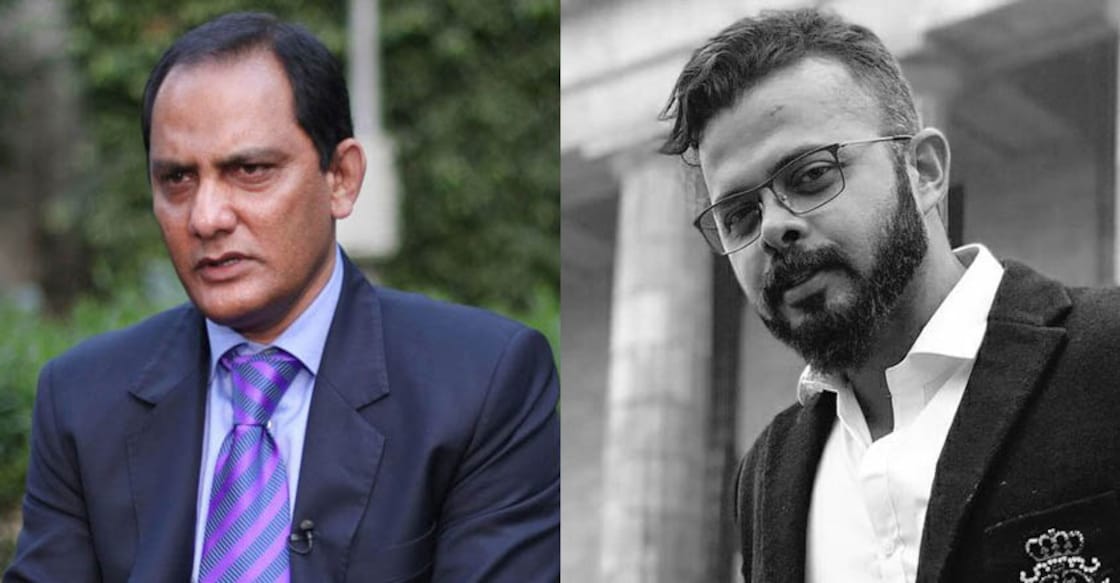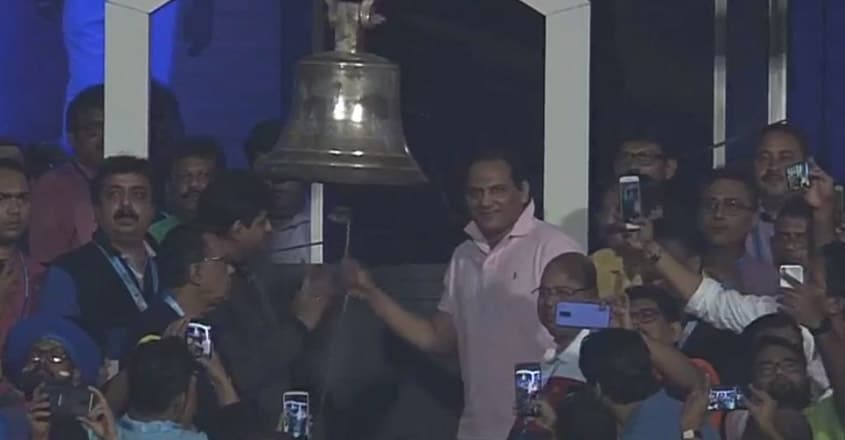BCCI's blatant double standard

Mail This Article
One of the new practices that has made its way to international cricket matches is the sounding of the bell before the commencement of a match. Organisers of the game ensure that a former cricketer of eminence is invited to perform the honours. The presence of a legendary player brings added prestige to the venue and the match, in addition to the eyeballs that it would fetch on television. One such occasion was Sachin Tendulkar sounding the gong before the start of the fourth One-Day International (ODI) between India and the West Indies at the Brabourne Stadium in Mumbai.
The first T20 International between India and the Windies in the ongoing series took place at Kolkata and the Cricket Association of Bengal (CAB) deemed it fit that the bell be struck by none other than former Indian captain Mohammad Azharuddin, who was handed a life ban by the Board of Control for Cricket in India (BCCI) for his role in match fixing. This incident would have gone unnoticed, but for Gautam Gambhir expressing his shock as to how the CAB chose to invite Azharuddin, who had to leave the game in disgrace and whose name is still associated, in public mind, with the murky world where cricketers maintained links with betting syndicates. In a tweet Gambhir stated that though Indian won the match the BCCI lost the plot and asked whether the policy of no tolerance to corruption took a leave on Sundays!
Azharuddin was implicated in the match fixing case that was investigated by the Central Bureau of Investigation (CBI) in the year 2000. This inquiry was ordered by the Union Government in the wake of Delhi Police releasing a shocking transcript of telephonic conversation between Hansie Cronje, captain of the touring South African side, and a Delhi-based bookie during the tour of Springboks to India that year. In the inquiry conducted by the Kings Commission in South Africa, three players confessed that they had been offered money by Cronje to underperform during the tour. Cronje, on his part admitted to the wrongdoing, but added that he was introduced to Indian bookies by Azharuddin during the 1996 tour. Cronje’s cricket career came to an abrupt end with this episode and he died in an air crash not too long afterwards.
The CBI commenced its investigation by searching the residences of several prominent Indian cricketers, including Azharuddin. It was reported in the media that Azharuddin admitted to fixing three international matches, during the period between 1996 and 1999. It had also come to light that he maintained close contacts with members of underworld who were active in the area of illegal betting. Government forwarded the investigation report of CBI to the BCCI, who appointed K Madhavan, a retired senior official of the investigating agency, as Inquiry Commissioner. Based on the inquiry report submitted by Madhavan, the sports body banned Azharuddin and Ajay Sharma for life and handed out a five-year ban to Ajay Jadeja and physiotherapist Ali Irani.
Azharuddin challenged the decision of the BCCI to impose life ban on him before the Andhra Pradesh High Court. The main ground in the appeal was that the BCCI did not have powers to appoint an Inquiry Commissioner. The High Court upheld the appeal thus setting aside the ban in 2012. The BCCI considered approaching the Supreme Court against this decision, but finally decided against it.

The gist is that investigations conducted by the CBI, the nation’s premier investigating agency, had found Azharuddin had maintained close relationship with members of betting syndicate and he was also involved in fixing international matches played by the national side. The life ban imposed on him by the BCCI was set aside by a Court of Law on technical grounds, not related to the facts of the case. Thus, one can say that findings of the CBI inquiry has not been declared as null and void by any judicial authority in the country.
However, one finds that the BCCI has quietly rehabilitated Azharuddin through the proverbial “back door”. He was extended invitation for watching an international match in the BCCI Presidents box and also allowed to contest elections to the Hyderabad Cricket Association, which, incidentally he lost. And now one finds that he has been bestowed with the honour of sounding the bell before the start of an international match, placing him in the same category of other retired players such as Tendulkar. In effect, the BCCI has forgiven Azharuddin for whatever “indiscretions” committed by him and taken him back into its fold, like a prodigal son who has returned to his parents.
I have written about this in such detail to highlight the contrast in attitude of the BCCI when it comes to S Sreesanth. The Kerala pacer was arrested by the Delhi Police in 2013 on charges of being involved in fixing matches in the Indian Premier League (IPL). The attempt by police authorities to detain him under the Maharashtra Control of Organised Crime Act (MCOCA) on allegations the he had links with betting syndicates controlled by Dawood Ibrahim came a cropper. Even as investigations were going on, the BCCI issued a charge sheet to Sreesanth and conducted a quick internal inquiry, at the end of which he was banned from playing the game for life in 2013. Since the BCCI had not conducted any parallel investigation it must be assumed that charge sheet issued by them was based on findings gathered by Delhi Police.
The charge sheet filed by Delhi Police was quashed by the trial court in 2015. The investigating agency has filed an appeal against this verdict which is pending before Delhi High Court. Sreesanth, meanwhile, approached the Kerala High Court and sought for lifting of ban imposed on him. A single bench of Kerala High Court ordered lifting of the ban by the BCCI, but the sports body moved with unusual alacrity and filed an appeal before Division Bench who upheld the punishment. The appeal filed by Sreesanth in apex court against the decision of Division Bench has not been decided.
When one compares the two cases certain things stand out. The first is the fact that the BCCI did not challenge the order passed by Andhra Pradesh High Court setting aside the ban of Azharuddin, while they moved with remarkable speed to file appeal when Kerala HC lifted the ban on Sreesanth. This has happened despite the order against Azharuddin being dropped on technical grounds while a Court of Law has found fault with the facts presented by prosecution in Sreesanth case. In other words, the court found that there did not exist enough evidence to implicate Sreesanth. The BCCI has surreptitiously brought Azharuddin into the cricketing mainstream by allowing him to contest elections and sound the bell even as they vociferously oppose Sreesanth’s efforts to learn a livelihood by playing the game in faraway Scotland.
Vengeance
What could be the reason for this difference in approach of the BCCI which would lay them open to charges of duplicity? In all probability, the vituperative vengeance demonstrated by the BCCI towards Sreesanth is on account of the lateral fallout of the IPL match fixing saga, which led to top honchos of the organisation losing their posts and the day to day running of the body passing on to the hands of a Supreme Court appointed Committee of Administrators.
The case booked by Delhi Police against Sreesanth and Co. was followed by one registered by Mumbai cops against another betting syndicate, which had links with Gurunath Meiyappan, son-in-law of N Srinivasan, then president of BCCI. The blatant efforts by Srinivasan to resist independent probe into Meiyappan affair and his reluctance to step down from the post set off a series of events that led to the apex court constituting a committee under Justice R M Lodha to look into the affairs of the BCCI and submit a report. The result of work of Justice Lodha, as things stand at present, is that all the erstwhile office-bearers of BCCI find themselves out of the powerful positions they held in this elite body. Hence it is only natural that they seek to blame the player whose alleged misdemeanours brought doom for them.
Looking from any angle, the BCCI has been extremely unfair to Sreesanth and this is made worse by the preferential treatment shown to Azharuddin. A body that is vested with the responsibility of conducting the affairs of the most popular sport in the country is expected to embody the virtues of transparency, just behaviour and fair play. Unfortunately, the BCCI has been found lagging in all these aspects, as the double standards adopted by them in this instance would show.
Doing very little
Eradicating the scourge of match fixing requires coordinated, multi pronged and sustained efforts involving players, administrators and law enforcing agencies. Apart from taking actions against individuals found to be inconvenient, the BCCI has done little of note in this regard. It hurts the fans of the game deeply when western agencies state that most of the bookies involved with fixing matches are of Indian origin. Unless the government and BCCI make known their intent to put a full stop to match fixing by taking strong action against the true perpetrators of this offence, the malaise will continue and ultimately destroy the vitals of the game. Knee jerk reactions and tokenism, which have been the standard response of the BCCI till date, would not serve any purpose nor convince anyone about seriousness of cricket administration in this regard.
It is extremely cruel to deny anyone his means of livelihood, least of all a player who has brought joy to millions of followers of the sport and been part of two World Cup-winning sides. Sreesanth has suffered more than enough for whatever sins he has committed; he should not be denied the justice that is due to him.
(The author is a former international umpire and a senior bureaucrat)


